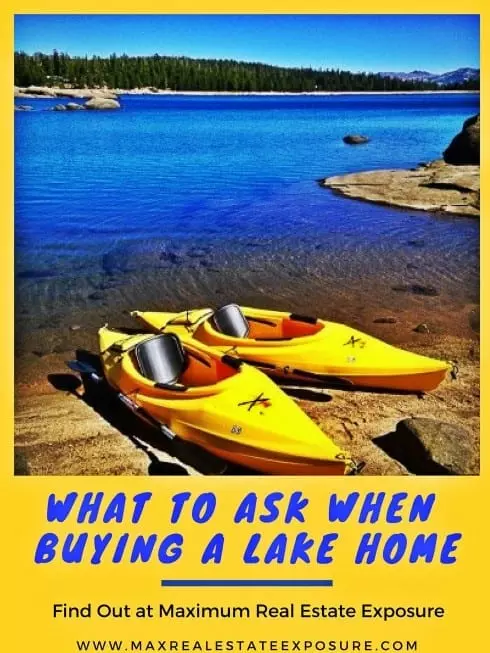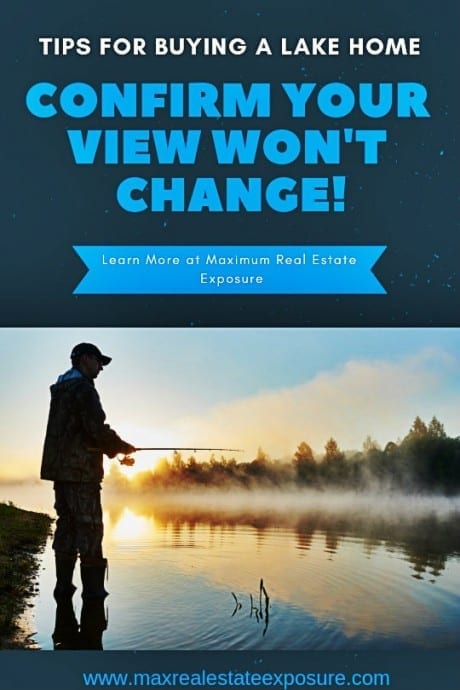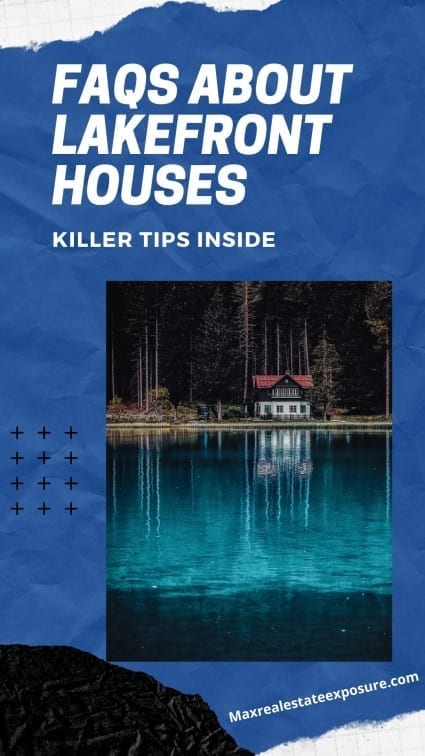 Are you looking for lake houses for sale? Buying a lake home is often a goal of many potential homebuyers.
Are you looking for lake houses for sale? Buying a lake home is often a goal of many potential homebuyers.
Houses for sale with lakefront are often a hot commodity.
Many dream of living on the water, whether a lake or an ocean.
Lakefront homes are an exciting lifestyle choice for many people. However, reasoning is more critical than ever when pursuing a property you want badly.
You can have a lakefront lifestyle, but you must consider all the factors when buying a lake house.
Buying a lakefront home differs on some levels from your traditional purchase. It is essential to understand these differences before leaping into lakefront living.
All things being equal, homes on a lake are typically more valuable than those without.
While your initial expense will be more significant, the potential for greater appreciation is typical with houses at the lake.
When the real estate market drops, lakefront houses tend to keep more of their value. What you should know, however, when buying a lakefront property is far more involved than your typical home.
What you need to consider when purchasing a lake house is somewhat involved.
From experience selling numerous lakefront properties over the years and owning one myself, many questions should be researched. Getting appropriate answers will ensure you’re comfortable with your investment.
Below is a series of questions you should consider asking when buying a lake house. Whether you are dealing directly with a seller or through a real estate agent, get these answers to ensure you’re happy with the purchase.
What is a Lake Home?
A lake house is a residence near a lake. Some are waterfront homes, and others are not. It offers unique characteristics and considerations for its design and structure, especially when on the water.
The plans and designs for lake homes often focus on scenic views. They come in various styles and sizes, designed to accommodate different needs. They can be a permanent residence, a vacation getaway, or a place to host family and friends.
In my experience as a real estate agent, I have seen that more expensive lake properties include large windows to take advantage of views and natural light. They often have open floor plans with easy access to the outdoors. Decks and porches are pretty familiar to extend the home’s living area.
The buyer personas I often see are those who love a peaceful place to call home, water sports, or water views.
The architectural plans can range from cozy cottages and simple designs to luxurious properties, with considerations for ecological building, accessibility, and even multigenerational living.
When is The Best Time to Buy?
Lakefront properties are like any other homes and can be listed for sale anytime. However, timing your purchase carefully can provide a more comprehensive selection and potential cost savings.
Potential buyers of lake houses will usually find the most homes for sale during the spring season. If your main goal is to find the perfect home, spring might be the most favorable time to purchase. Remember that there may be increased competition during this period as homes sell for more than their listed price.
It can be wise to buy towards the end of summer or fall to minimize competition and cut costs. During this period, sellers might be more inclined to sell their lake homes before the winter season arrives.
How Much Does a Lake House Cost?
Houses for sale on a lake are usually more expensive than their non-waterfront counterparts, and they are always in high demand.
You should expect your home insurance to be higher when buying a lake house. If the home is considered in a flood plain and flood insurance is required, it will be even more expensive.
It is also likely that the assessed value will be higher, leading to an increase in the property tax assessment you’ll pay.
Planning for these additional expenses when buying a lake home is essential. For most people, these extra costs are worth it due to the pleasure of owning a waterfront home.
Current State of The Houses at The Lake
Living on a lake can be a lot of fun, but it has drawbacks. The moisture in the air, the weather patterns created by the lake, and the rise and fall of the water level can all lead to property degradation.
If it is not kept in good repair with regular maintenance by professionals, its proximity to the lake can lead to property damage. Wood, metal, and stone can all be affected by the lake’s unique conditions.
Like any other property, you will want to inspect it with a fine-tooth comb. Ensure you hire a qualified home inspector who will take the time to inspect the property from top to bottom.
Specifically, look out for the top home inspection problems, especially bug infestation and water issues that can be found more readily near lakes.
When looking at houses for sale with lakefront, it will be essential to have a home inspection checklist.
Understanding The Orientation Can Be Helpful
When living on a lake, you will want to consider the orientation to the sun and how it sets. Does the home get morning or afternoon sun?
Does the deck have any sun protection if you are getting afternoon sun? How do the winds coming off the lake affect your enjoyment of the property and the heating costs?
This should be a primary consideration when looking at lake houses for sale.
Get Specific Information About The Lake and Houses For Sale
 Lakes vary considerably, meaning one lake might be perfect for you while another is undesirable. You do not want to discover that the lake you bought a home on is nothing like what you want.
Lakes vary considerably, meaning one lake might be perfect for you while another is undesirable. You do not want to discover that the lake you bought a home on is nothing like what you want.
Find out as much information as you can about the lake.
Here are some excellent questions to ask when considering buying a lakefront home:
- Is the bottom rocky, sandy, or muddy?
- Is there a dock for boats?
- How busy is the lake during each season?
- What recreational opportunities are available on the lake? Kayaking, boating, fishing, swimming, scuba diving, snorkeling, water skiing, waterfowl hunting? Some lakes are better suited than others for particular kinds of activities.
- Are jet skis allowed when the lake freezes?
- What is mosquito season like?
- Is there any wildlife on the lake, such as ducks or geese, that could become a nuisance?
- Is the shoreline sandy, rocky, or muddy? How easy is it to access the shoreline from your home?
- Does the lake maintain its water level or go up and down with the seasons?
- Is the lake stocked with fish?
- Does duckweed ever become a problem?
- Does the lake flood? How close is your home to the flood line?
- Are you required to carry flood insurance?
- How easy is getting your boat in and out of the lake if you’re boating? Can you have a dock right off your house, or is traveling around the lake for an access point okay?
- Are there any specific things that are not allowed on the lake?
- Are there any local ordinances about noise or having parties in or around the lake?
These questions may or may not pertain to the lake you are considering buying on, but they are great things to consider.
Is There an Association?
Find out if a homeowner’s association or other organization controls the lake area where you plan to buy. It is always a good idea to find out the nature of any organization you must join to enjoy your property and the lake it sits on.
These kinds of organizations can vary greatly in how they handle issues.
Ensure you can do what you want and enjoy your property before buying into an area. The last thing you want as a buyer is to find out there are things you were counting on being able to do and are not allowed to do.
Having a Lake association is generally good, as they are formed to protect the lake’s future and resolve any issues that could threaten its health.
The members of a lake association meet when necessary to discuss lake problems and determine courses of action to remedy any issues.
Often, members attend town meetings to advocate for the lake, apply for grants to protect or improve the lake, and monitor the lake for invasive species. Having a lake association greatly benefits those living there most of the time.
There could be occasions, however, when an HOA places overbearing, authoritative restrictions. You’ll want to determine if that is the case when looking at lake houses for sale.
Decide if This is a Vacation Home or a Primary Residence
If you are purchasing this home as a vacation property, you may have different property needs than if it is a primary residence.
The weather patterns and seasonal temperatures may not matter for a vacation home because you will only be visiting during the ideal seasons.
If you want to live here year-round, though, you will need to pay more careful attention to the seasons—especially if you are an older buyer who may struggle with more severe weather.
Understanding Investment Potential
When considering the purchase of a lake house, evaluating its investment potential is crucial. Over the years, many potential buyers have asked me if a lake home is a good investment. You bet it is!
Waterfront properties, especially those on lakes, often come with a premium price tag due to their desirable location and the unique lifestyle they offer.
Investing in waterfront real estate can offer unparalleled views and a unique lifestyle, but it’s essential to consider the higher maintenance and insurance costs.
However, your initial higher investment can become significant property appreciation over time. Lake homes in sought-after locations have historically appreciated faster than their non-waterfront counterparts. It can make them a potentially lucrative investment.
Several buyers have asked me about appreciation. Having a lake nearby undoubtedly increases the selling potential and sale price.
You Can Generate Good Rental Income
Moreover, owning a lake house opens up the opportunity to generate rental revenue. With the rise of vacation rental platforms, lake properties have become increasingly popular with those seeking a place to get away.
Turning your lake house into a vacation rental allows you to tap into this demand. You can generate income to help cover ownership costs, such as maintenance, insurance, and property taxes.
A lake house can be a lucrative vacation rental investment, especially in popular tourist destinations with high demand for waterfront properties.
Consider The Costs
I do recommend you consider the additional costs of owning a waterfront property. Flood insurance, for example, is often necessary for lake houses due to their proximity to water.
In addition, waterfront properties can have higher maintenance costs due to their exposure to the elements and potential storm damage.
Before making a purchase, it’s advisable to research the local real estate market, understand the seasonal demand for rentals, and consider the property’s long-term appreciation potential.
I recommend speaking with a real estate agent specializing in waterfront properties. They should be able to provide valuable insights and help you make an informed decision.
Are There Modern Conveniences Nearby
 Another thing to consider if you plan to live here year-round is access to essential medical care, grocery stores, and dining options.
Another thing to consider if you plan to live here year-round is access to essential medical care, grocery stores, and dining options.
Getting out of town into the middle of nowhere may be great for a few weeks, but not everyone enjoys such isolation year-round.
How easy is it to get to major routes? Will getting in and around the area be difficult during inclement weather?
Size is another factor that may vary based on your planned home usage.
If you want to live in the home and have company during the high season, you will probably want a larger home with extra bedrooms for guests.
A smaller home might be okay to bring the spouse and kids out during the summer.
Make Sure The Lake It Is Designed For Winter Use
Some homes for sale with lakefront are set up to be used during the warmer months of the year and left empty when winter comes around.
If you want to use the home during the cold weather, you will like it to have proper insulation and heating options to remain comfortable.
Make sure the house is equipped for winter living if this is something you need.
Check The Expansion Possibilities
On many lakes, there is a wide variety of housing. In some lakefront locations, the housing started as small vacation-style cottages only to be expanded upon and turned into permanent residences.
Local zoning can vary quite a bit on a lake—sometimes, the lots’ size is much smaller than lot sizes in a non-waterfront location. Sometimes, finding an acre or more will be challenging.
Discovering what you can and can’t do before purchasing is essential.
You may have grand visions of adding a second story or a significant addition and discover it’s impossible. It’s better to find out before than after you have made your purchase.
Is The Property Serviced by a Septic System or Public Sewer
Whether or not a town sewer is available is essential for many home buyers. Septic systems can be very costly to replace, especially near a lake.
Many communities will, at some point in the future, install a sewer system due to the sensitive nature of the lake’s quality.
You should consider planning for this expense if a public sewer is unavailable. It is essential to understand what is involved with buying a home with a septic tank.
Legal, Conservation, and Zoning Restrictions Are Essential to Research
Owning a lake house comes with a unique set of legal, conservation, and zoning considerations that potential buyers must navigate.
Waterfront properties are often subject to stricter regulations to protect the natural environment and maintain water quality. For example, local conservation boards may restrict construction, landscaping, and other activities within a certain distance from the lake to prevent erosion and pollution.
Specific regulations may not be as strict elsewhere when living on a lake. Lakes are considered wetlands, so they are afforded different protection under the Wetlands Protection Act. I always suggest my clients research this aspect before writing an offer.
Additionally, zoning laws can affect what you can and cannot do with your property. These may include limitations on building size and height, the construction of docks or boathouses, and vegetation removal. Lakefront properties are often part of a homeowners’ association (HOA) or a lake association, which may have its own rules and fees.
Know The Local Rules
The local conservation board will likely want to know anything you do to the property within 100 feet of the lake.
Most cities and towns also have strict “no disturb” rules that apply to areas directly bordering the lake – most of the time, 25 feet.
In most locales, this restricts building, clearing, planting, etc. The purpose is to maintain a natural buffer for the lake and impact any flans you may have. Make sure you keep this in mind.
Do your homework when you see a property advertised as having “lake access” or “right of way to Lake.” While these advertisements certainly could be accurate occasionally, mistakes have been made that were complete misrepresentations.
Sometimes, people assume there are easement rights when there are none.
When this kind of representation is made, it is always wise to consult a real estate attorney who can do a title search to check the accuracy.
Lakefront houses can have antiquated zoning that allows for unusual things. It will be worth researching this aspect of buying a lake home.
Before purchasing, I recommend thoroughly researching and understanding these restrictions. This may involve consulting with the local government, reviewing the property’s deed for easements or covenants, and speaking with HOA or lake association members.
Being well-informed about these regulations can help you avoid potential legal issues. Your due diligence can ensure your lake house dream doesn’t become a regulatory nightmare.
Make Sure The View is Adequate
 One of the best parts of living on the lake is looking out over the water every morning. Unfortunately, not every home labeled as a lake home offers this view.
One of the best parts of living on the lake is looking out over the water every morning. Unfortunately, not every home labeled as a lake home offers this view.
Depending on your needs or budget, the view might not be a priority.
However, if you want to get the most out of lakefront living, you should ensure that the view from your home fits your desires.
You might also want to know if the lake has been completely developed. Your view at the time of your purchase could change if there are still building lots surrounding the property or the other side of the lake.
You could be looking at something completely different than you planned at a moment’s notice.
I know of a few lakefront owners who have had views impaired or changed by others on the lake.
Determine How Easy it is to Get to The Lake.
Some lakefront houses are technically on the lake, but the lots are so steep that getting to the water can be challenging.
If you plan on growing old with the home, you will want a flatter lot.
As you age, climbing up and down a steep lot to get to the water will become more complex and demanding. Many people don’t consider this when buying on a lake.
Decide on How Much Privacy You Want
The closer you are to the water, the easier it is for boaters and lake users to see your home. This may or may not be a problem for you, but it is worth considering when looking at different properties.
Lots with more distance between the home and the water – a distance that still offers a clear line of sight – are usually more expensive than those right on the water.
The extra cost may be worth it, though, if you want to sit out on your front porch in your underwear and still be able to watch the sunset.
Hire a Realtor You Can Trust
Whether buying or selling a lakefront house, you want to work with a Realtor who understands the complexities of buying and selling a home on a lake.
Avoid randomly picking a Realtor when buying a lakefront home for sale. Interview agents to find out how well they find lakefront homes that satisfy their clients.
You want a person on your side that can get you a good home within your budget – a home you can enjoy for decades.
Due to higher demand, lakefront homes are naturally more challenging to find at a reasonable price. With the right agent, the search becomes more manageable, and you will likely get a good deal on the house.
This is more than worth the Realtor’s commission charged for their assistance.
When buying a home, understand that lakefront property will carry a particular premium over non-lakefront property. How much of a premium is a matter for a qualified real estate agent to determine.
Some factors are involved, including the town, the type and size of the lake, the size and characteristics of the lot, neighboring properties, water quality, privacy, proximity to amenities, and highway access.
When selling a lakefront home, understand that marketing the property well becomes vital. Choose an easily found agent on the internet who does an exceptional job with photography and real estate descriptions.
The Realtor you select should have excellent marketing skills and be able to differentiate between buyers looking for a lakefront property and a more traditional one.
As you can see, there is much to think about when buying or selling a lake house!
If you are considering buying or selling a waterfront home, I welcome the opportunity to help you accomplish your goals.
Pros and Cons of Buying a Lakehouse
The pros outweigh the cons of buying houses on a lake. Let’s take a look.
Pros
- Magnificent water views every day
- Potential for water sports
- It feels like you are always on vacation
- Lakefront houses are usually an excellent investment
Cons
- Additional potential for flooding
- More potential maintenance
- The lake could be noisy due to the recreation
- Potential for higher insurance costs, especially when flood insurance is required
- There is less privacy on some lakes with small lots
- More property restrictions
- Potential for more bugs and wildlife
How to Find Houses For Sale With Lakefront
Houses for sale on a lake are not always easy to find.
Besides finding a top local real estate agent who does a lot of business in the town you’re looking in, you may want to consider doing online searches to find lakefront homes.
Lakefront houses near me or lakehouses for sale near me should produce some results.
It is possible the area you are looking at might not have a significant amount of inventory, so keep your eyes peeled for the next one that hits the market.
Houses for sale by the lake are not always easy to come by as they are high-demand properties.
How Do You Find Lakefront Houses Near Me That Are For Rent?
Finding houses for sale by a lake is challenging, and so is finding rentals. The best place to start is with a local buyer’s agent. If you can find one that specializes in lakefront rentals, that will be even better.
When you start your search, use Google to help you begin your investigations for rentals. Searching lakefront houses for rent near me will be your best option.
Frequently Asked Questions
 1. Is buying lake houses an excellent financial investment?
1. Is buying lake houses an excellent financial investment?
Yes. Homes that are located on bodies of water tend to appreciate faster than those that are not waterfront.
2. Are lake houses more expensive?
Yes. A comparable home on a lake will be worth more money. Waterfront properties tend to command more money than their dry land-only counterparts.
3. Are homes with a dock more desirable?
Yes. A dock lets you have a boat or other recreational vehicles more efficiently. Your lake house with a dock will also be worth a little more money.
3. Is it worth it to live on a lake?
Those who decide to buy a lakehouse for sale are usually not disappointed. Most people living on lakes do so because of the extracurricular activities they enjoy.
4. Is it hard to find lakefront houses to rent?
Yes. Any home on the water tends to be in demand and will go quickly, whether for sale or rent.
If you are looking for lake houses to rent, you might want to find an agent specializing in home rentals at your desired location.
You could also do the same for rentals, like searching for houses on a lake for sale.
Lake houses for rent near me or lake houses to rent near me should do the trick. Unless you are in an area with many lakes, you probably won’t see many results.
Final Thoughts
There is truly something magical about owning a lakehouse. Being on the water gives you a naturally great feeling. It is always better to do it at sunrise or sunset from a lake location.
Keeping an eye on market trends is crucial for buying or selling a lake house, as the real estate market can fluctuate based on various factors.
When buying, do all the standard due diligence you would with any other home and then some. The little extra time you spend researching the lake you plan to live on will be worth it.
Feel free to contact me if you want lakefront houses in the Metrowest, Massachusetts area. Someone from my team can assist you in finding houses on a lake for sale.
Other Helpful Lake Home Buying Resources
- Check out information on specific lakes across the United States. The Army Corps of Engineers provides a detailed overview of some of the more recognizable lakes around the country.
- The National Lakes Assessment, a resource on lake information provided by the Environmental Protection Agency, has some helpful lake house tips worth reading.
Use these additional resources to generate further questions when buying lakefront property.
About the Author: The above Real Estate information on buying a lake home was provided by Bill Gassett, a Nationally recognized leader in his field. Bill has expertise in mortgages, financing, moving, home improvement, and general real estate.
Learn more about Bill Gassett and the publications in which he has been featured. Bill can be reached via email at billgassett@remaxexec.com or by phone at 508-625-0191. Bill has helped people move in and out of Metrowest towns for the last 38+ years.
Are you thinking of selling your home? I am passionate about real estate and love sharing my marketing expertise!
I service Real Estate Sales in the following Metrowest MA towns: Ashland, Bellingham, Douglas, Framingham, Franklin, Grafton, Holliston, Hopkinton, Hopedale, Medway, Mendon, Milford, Millbury, Millville, Natick, Northborough, Northbridge, Shrewsbury, Southborough, Sutton, Wayland, Westborough, Whitinsville, Worcester, Upton, and Uxbridge MA.


 1. Is buying lake houses an excellent financial investment?
1. Is buying lake houses an excellent financial investment?